Patricia Rozema’s Mansfield Park (1999) is a unique and brazen adaptation of Jane Austen’s novel, bringing out the book’s themes and morals in interesting ways.
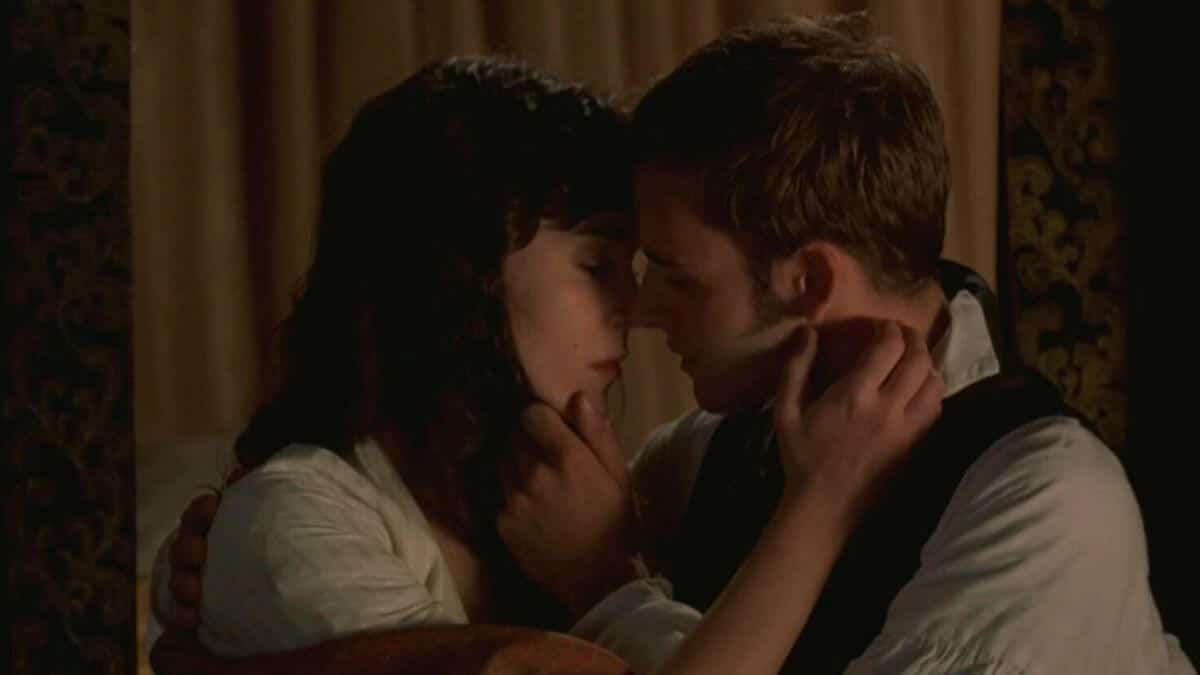
Her less-than-faithful script may raise the eyebrows of a few Jane Austen fans – but if looked at with objective eyes – it can be appreciated for what it is: a brilliant romantic satire worthy of standing as one of the best and most intelligent romantic period dramas to ever grace the silver screen.
The Story
If you’ve read Jane Austen’s Mansfield Park, then you know the basic premise. However, this adaptation brings new elements into the story by combining the book with biographical aspects of Jane Austen’s own life.
When Fanny Price is ten years old, she leaves her poor family in Portsmouth to live with her wealthy relatives in the country at Mansfield Park.
In a Cinderella-like story, Fanny is raised as a companion to her cousins, akin to a servant – though with some educational perks. She is only treated with genuine kindness from her cousin Edmund Bertram.
As Fanny grows, she becomes a smart, quick-witted young woman aspiring to write novels. She also develops unrequited feelings for Edmund, who is seemingly unaware of her affections.
Soon, the arrival of Henry and Mary Crawford (siblings with “modern” sensibilities), turns Mansfield Park on its head with their seductive, rebellious views. The good-looking duo quickly catches the interest of everyone, everyone but Fanny, who suspects their questionable morals.
When Henry Crawford falls in love with Fanny, a seemingly good match for the time and her own “lesser” status, will she be able to hold true to her morals and heart? And will the underlying immorality of the Bertram’s wealth destroy the family?
Mansfield Park (1999) Cast and Characters
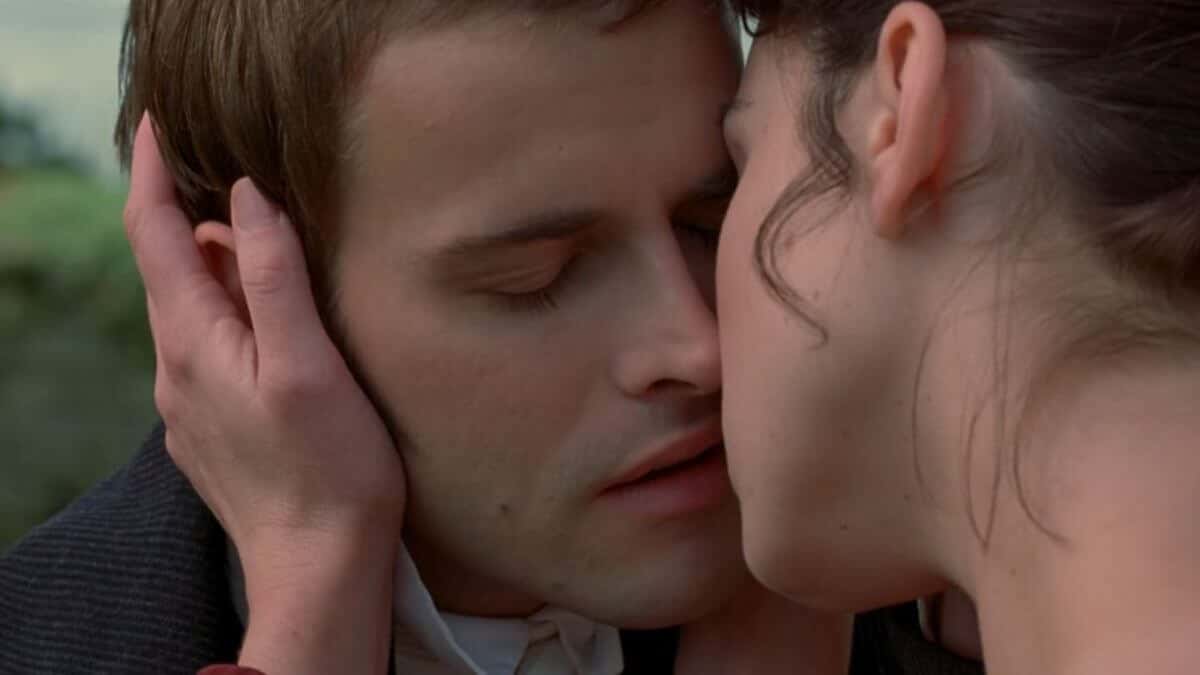
Frances O’Connor takes the lead as the lively heroine, Fanny Price, and gives an exuberant, layered performance. She’s the moral center of the film, leaving the audience torn between agreeing with her and falling under the seductive spell of the Crawfords.
She’s a witty Cinderella-type stuck in an intolerable situation. But with courage and heart, Fanny overcomes her trials, earning herself her HEA – as all Austen heroines are accustomed to do.
As the romantic leading man is the always fabulous Jonny Lee Miller as Edmund Bertram. In what easily could have been a self-righteous character, Miller, instead makes him emotional, empathetic, and utterly romantic.
He’s a man torn between duty and his heart. And yes, he’s tempted by the cunning Mary Crawford. He falls under her spell, but he does ultimately try to do what’s right – making him worthy of Fanny. The movie would have failed without the believable romance and chemistry between Fanny and Edmund. If you’re not a fan of the two in the books, you’ll likely root for them in the film.
RELATED: MISS AUSTEN REGRETS: A BEAUTIFUL PERIOD DRAMA ABOUT JANE AUSTEN
In other standout roles, Alessandro Nivola delights as the swoony bad-boy, Henry Crawford, tempting the audience to love him just as he tempts Fanny.
Embeth Davidtz as Mary Crawford is a scene-stealing social climber, perhaps stuck in the wrong time period. With clear lesbian undertones, one questions whether Mary is in love with the intelligent Fanny rather than the conservative Edmund. But Mary is a shrewd businesswoman and realist and marriage is the ultimate business of the time. That’s where her power is, and she knows it.
Lindsay Duncan plays dual roles as Fanny’s poor mother, Mrs. Price, and the wealthy, opiate-addicted, Lady Bertram. She comedically and heart-wrenchingly plays the two sisters who chose different paths in life. It’s a behind-the-curtain revelation of what it meant to live in poverty and marry for love in this time period. And it isn’t pretty.
Harold Pinter frightens as the head of the household, Sir Thomas Bertram. He switches from fatherly and loving patriarch to ruthless manipulator, making one wonder what his true character is. He is, perhaps, one of the greatest examples of hypocrisy in the film.
James Purefoy, in a small but significant role, spirals into self-destruction and near-death after learning horrifying truths.
In the film, you’ll also find Hannah Taylor-Gordon as a young idealistic Fanny, Sheila Gish as the cold-hearted Mrs. Norris, Victoria Hamilton as the reckless Maria Bertram, Justine Waddell as Julia Bertram, Sophia Myles as Fanny’s younger sister Susan, and Hugh Bonneville as the foolish Mr. Rushworth.
In all, Mansfield Park includes a cast of period drama royalty. Smartly, Patricia Rozema cast the film based on talent rather than on super-stardom. And it shows.
Mansfield Park 1999 Adaptation
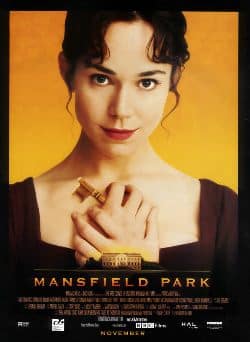
Many ask, which adaptation of Mansfield Park is best and why. While there has yet to exist a truly faithful version done well as a film (the ’80s miniseries is good – but feels more like a dramatized play) of Jane Austen’s book, this film, with its production quality, intelligence, underlying societal commentary, and swoony romance, soars above the others. The morality at the center of the film and within Fanny captures the essence of Jane Austen’s story, even though it takes some liberties.
Like how director Baz Luhrmann took The Great Gatsby and showed its relevance to contemporary society by including modern music and filmmaking techniques, Rozema similarly takes Jane Austen’s underrated novel and fills it with elements of modern politics and current, relatable human two-facedness which in turn brings out just how genius Austen’s novel is. Those elements are still there, just presented in a slightly different way.
RELATED: LOVE & FRIENDSHIP: A WITTY TAKE ON JANE AUSTEN’S NOVEL, LADY SUSAN
In the book, Fanny may seem more passive and less “feisty” but she’s also moral and full of integrity. In a sea of hypocrisy (including the “righteous” Edmund), Fanny holds true to her beliefs of what’s right. And, in the end, she’s able to have her happily ever after.
By turning the main character into a Fanny Price/Jane Austen hybrid, Rozema arguably brings out Austen’s intent for Fanny by making the character less subtle. Fanny even speaks directly into the camera.
Now, Fanny is still introverted in the film – though she speaks her opinions more easily. So, she is still Fanny and has the same convictions. But by giving her Jane Austen’s powerful voice (using her own letters as inspiration for dialogue), Fanny shines. The common misunderstanding of her character (often judged with a modern lens) dissipates with this interpretation.
That all said, the commentary infused into the adaptation and the liberties taken may not be to everyone’s liking. I, however, found the film to be brilliant. I’ve personally watched the movie over 20 times throughout the years and always find something new to enjoy.
Overall Thoughts
Mansfield Park (1999) is an enjoyable, witty romance, and full of biting satire lost in many Austen adaptations. Sometimes, it’s easy to forget that while Jane Austen’s stories are full of romantic heroes, sweeping romance, and HEAs, they’re also literary parodies and satires of society.
The loss of humor and satire in a Jane Austen adaptation happens when a screenwriter and director focus too heavily on the plots and, as a result, miss Austen’s intellectual depth and storytelling nuances.
Patricia Rozema understands Jane Austen and pays tribute to her with this film. By mixing elements of Jane Austen’s life with Mansfield Park, a story about morality and hypocrisy, Rozema brings out themes difficult to adapt to the screen. She also acknowledges just how amazing Jane Austen was at a time when being a female author would have been anything but easy.
Yes, this adaptation is not exactly faithful to Mansfield Park, however, it is faithful to Jane Austen herself.
In the end, the film could have turned out differently I suppose. “But it didn’t.” And I think it’s all the stronger for it. Jane Austen would be proud.
Where to Watch: You can rent/buy from various streaming sites such as Amazon Video or buy on DVD.
Content Note: PG-13 for sexual situations and a few disturbing drawings depicting sexual violence.
Have you seen Mansfield Park (1999)? What are your thoughts on this controversial Jane Austen adaptation? Did you love it as much as I did?
Photo Credit: Miramax



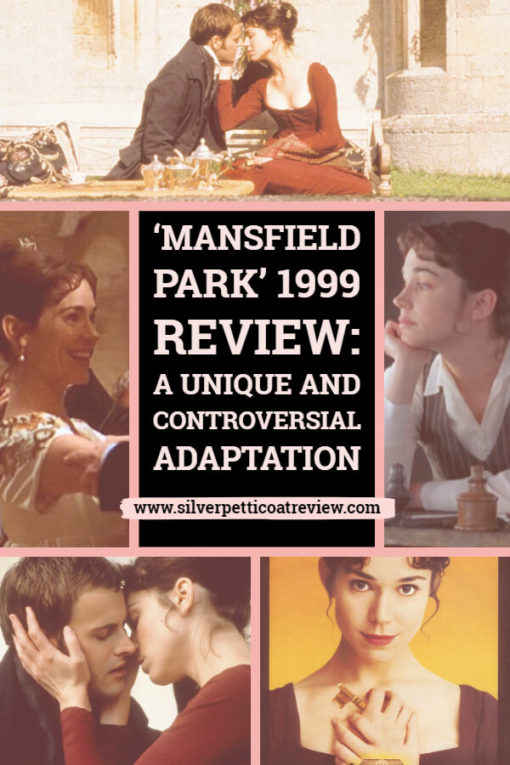
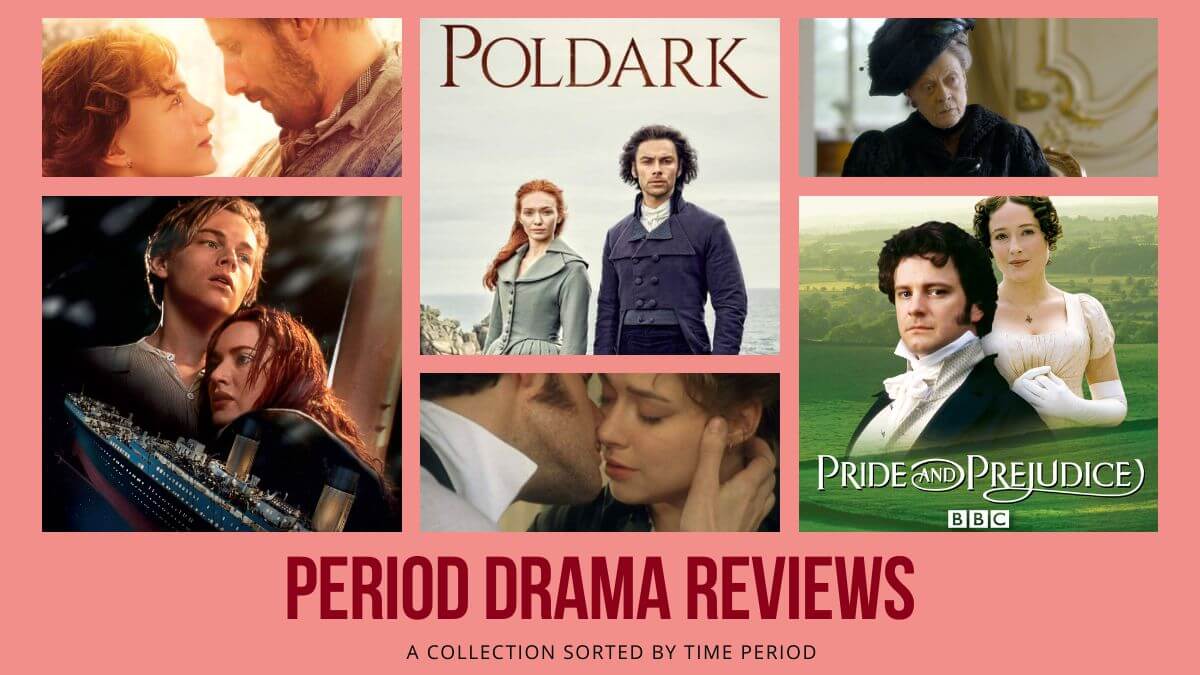
I have to admit, I’ve been very nervous about any film version of Mansfield Park. With a realism and conflict stronger than her other novels (my opinion), it’s my favorite of Jane Austen’s work. It’s also the most difficult to translate for reasons stated in this article. But I think I’ll give it a try. I mean, any version in which Edmund is as human as he is in the books need to at least have a chance, right? Thank you. 🙂
Yes, definitely! Give it a chance. 🙂 Even if it’s not “exactly” Mansfield Park, Jonny Lee Miller is fantastic as Edmund.